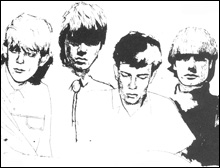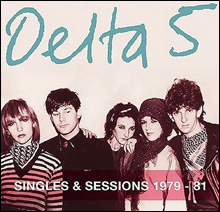
GLASWEGIAN WOOD: In the days of the grim, pleasure-denying sound of Joy Division, Orange Juice offered signs of a pop-inflected counterstrike.
|
In an FAQ for his UK-based label 12XU, Matador head and contrarian tastemaker Gerard Cosloy recently wrote: “No, post-punk does not actually exist.” That claim would come as a surprise to Simon Reynolds, whose book Rip It Up attempts to gather an explosive variety of late-’70s/early-’80s musical activity under the post-punk banner — not to mention to anyone who uses the label as a critical catchall for current artists, from Interpol to DFA, who sound to many ears like the belated report from a two-decade-old blast of innovation.
Even so, you can see Cosloy’s point: “post-punk” never designated a musical genre so much as a point of origin. Especially in the UK, the bands arrayed by Reynolds took the slate-wiping Year Zero rhetoric of the Sex Pistols and their brethren so much to heart that they quickly shed punk’s own drainpipe-straight confines to embrace new instruments and technologies (Pere Ubu, Cabaret Voltaire) and black musics from funk to dub to disco (the Pop Group, PiL). Still others drew from the more academic end of experimental music, like Wire, from whose songbook Cosloy’s British label takes its name.
In the face of this forking garden of stylistic options, a recent spate of reissues confirms that many of the offshoots are more fun to sniff to than to taxonomize. Such releases are often by-products of the rage for a given subgenre’s current practitioners. Earlier in this decade, the rise of a clutch of New York–based dance-rock acts (Liars, the Rapture, Radio 4) led to an outpouring of material from their early-’80s East Village counterparts, especially those associated with the storied ZE label. More recently, namechecks by — and critical comparisons to — Franz Ferdinand have renewed interest in a pair of their Scottish predecessors.
Wearing its geography on its sleeve, The Glasgow School (Domino) is the first US collection of Orange Juice’s singles on that city’s Postcard imprint in 1980-’81, along with album sessions scrapped after label mastermind Alan Horne encouraged the band to sign to Polydor. Although Reynolds’s book is named for a later line-up’s biggest UK hit, these early releases are pivotal to his story. In their time, when the grim, pleasure-denying sound epitomized by Joy Division was de rigueur in British independent music, “Simply Thrilled Honey” and “Falling and Laughing” were signs of a pop-inflected counterstrike.
The songs of Edwyn Collins and James Kirk reveled in middle-eights and clever modulations; meanwhile their guitars found an unlikely meeting ground between Nile Rodgers and Roger McGuinn. The band had its perversely arty side as well, backing one single with the instrumental “Moscow” and its rudimentary dub remix (“Moscow Olympics”) and capping Kirk’s fey “Poor Old Soul” with a sudden football cheer of “No more rock ’n’ roll for you.” There are only two unreleased cuts on The Glasgow School, but they mark the pop and punk extremes the band synthesized: “Blokes on 45,” a five-song medley modeled on the novelty hit “Stars on 45 Medley,” and a rehearsal-room take of the Stooges’ “I Don’t Care” credited to the members’ previous incarnation as the Nu-Sonics.

PROGENITORS: Without bands like Delta 5, half the Kill Rock Stars roster might never have lifted an instrument.
|
Only trace elements of Orange Juice’s music have filtered down to Franz Ferdinand, mostly in the form of a shared penchant for octave-leaping disco bass lines. You could argue for a closer match in fellow Postcarders Josef K — or their Edinburgh contemporaries Fire Engines, whose Codex Teenage Premonition (Domino/Creeping Bent) is an odds-and-sods collection of early-’80s live recordings, radio sessions, and ragged studio tracks laid down well before their first official release. (Fond, a 1993 compilation of their better-realized efforts, remains out of print.)
Anchored by standout drummer Russell Burn and punctuated by David Henderson’s adenoidal yelps, the spiky, riff-propelled “New Things in Cartons” and “Hungry Beat” owe something to the tumble-down lope of the Fall’s “country-and-northern” period. It’s only in retrospect that this raw rhythmic material sounds like something that could be mined for commercial gold. But that’s just what Franz Ferdinand did, even repaying the favor by inviting the Engines to re-form long enough to share a tour — and one side of a let’s-cover-each-other’s-songs split single, included here — in 2004.
These bands graze the edges of the sound that “post-punk” now calls to mind. Delta 5 hit the double bull. Singles & Sessions 1979-81, on Kill Rock Stars, is a fitting sequel to the Washington label’s reissues of work by Essential Logic and Kleenex/Lilliput; without such examples, half the KRS roster might never have lifted an instrument. The group shared a jagged, unadorned sound — and an art-school background — with Gang of Four and the Mekons. What set them apart was their mixed-gender line-up, with frontwomen Bethan Peters, Ros Allen, and Julz Sale turning every song into one side of a politically freighted lovers’ quarrel.